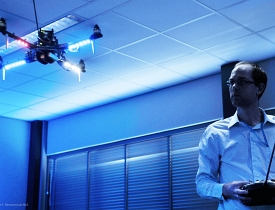 Preparations are underway for the first training centre in Europe for operators of ‘Unmanned Aerial Vehicles (UAVs). This centre will be located at Gate2 Aerospace & Maintenance in Rijen, an aviation campus situated in Brabant. ‘Unmanned aviation is growing and hence there is a need for well-trained operators on the ground,’says training and simulation section manager, Harrie Bohnen, from the National Aerospace Laboratory (NLR).
Preparations are underway for the first training centre in Europe for operators of ‘Unmanned Aerial Vehicles (UAVs). This centre will be located at Gate2 Aerospace & Maintenance in Rijen, an aviation campus situated in Brabant. ‘Unmanned aviation is growing and hence there is a need for well-trained operators on the ground,’says training and simulation section manager, Harrie Bohnen, from the National Aerospace Laboratory (NLR).
Inspecting wind towers or electricity pylons, with unmanned aircraft this is much easier and safer to do than having a technician stand on a ladder. And it is also much less expensive than hiring a crane. ‘A pair of extra eyes in the sky’is also useful for detecting forest fires, for example, or monitoring hooligans during football matches and conducting military reconnaissance. ‘One can think of numerous applications,’Bohnen adds. ‘And also this can often be done at a low cost.Â
At this new training centre, NLR, in collaboration with WCAA, AEC Air Support B.V. and the University of Tilburg, will conduct research into the possibilities for UAV operator education and training. ‘The developments are coming in quick succession. There are increasingly advanced unmanned aircraft in the air space, carrying out both very minor and very complex tasks. Hence, there is an increasing demand for operators.’These operators must be able to operate the ‘control stick’ safely and professionally, with both feet on the ground, remotely operating, for example, cameras or radar, and, if needed, to also provide maintenance and repairs, and all in accordance with increasing regulations. These are all reasons for initiating a training centre. The collaborating parties moreover can also expect to receive a REAP* subsidy.
The training centre must provide a comprehensive programme for students from civilian companies, government, and also possibly from the Ministry of Defence. Gate2 was chosen as the ideal location for the centre. ‘Gate2 offers good facilities and is centrally located for the expected users of the training centre. In addition, Brabant is suitable for conducting practical exercises, as the required air space infrastructure is available,’Bohnen explains. The training centre is expected to be operational in 2014.
This Training Academy is an example of how NLR supports regional initiatives in the aerospace sector. Companies, government and knowledge organisations will all work together in this so-called Golden Triangle. NLR’s role in this is clear: to make important contributions to strengthening our industry.
NLR has developed a wealth of knowledge and expertise in the field of UAV and Unmanned Aerial Systems (UAS).
For more information:
https://www.nlr.org/news/flying-start-for-nlrs-new-uaslab/
https://www.nlr.org/capabilities/modelling-and-simulation/
*The Regional Action Program (REAP) West-Brabant is a government and private sector incentive programme aimed at improving employment opportunities in the region via practical projects and bolstering the competitiveness of companies.


